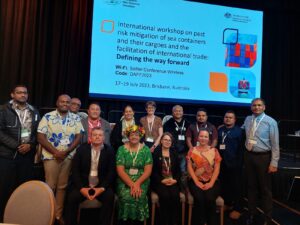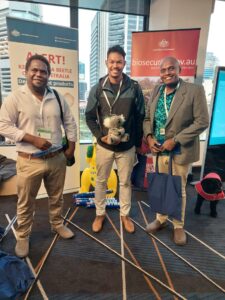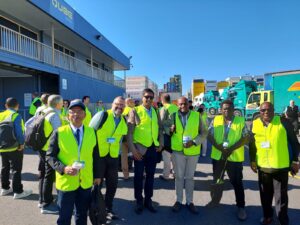Supporting a safe and sustainable sea container pathway for Solomon Islands
Availability and cost of sea freight from Solomon Islands is recognised as a major constraint for the export sector. PHAMA Plus has invested in interventions towards addressing this such as Less Than a Container Load (LCL) Access to Markets project and Transport Symposium in Solomon Islands. One factor that slows container movements and contributes to increased costs is the need to ensure that containers are adequately clean and are not spreading pests, diseases or other materials of biosecurity concern. Delays due to on-arrival inspections and biosecurity treatments can be avoided by establishing practical systems to ensure biosecurity compliance and allow for efficient handling and clearance.
To address these issues, a three-day international workshop was held in Brisbane, Australia, from 17-19 July 2023, jointly organised by International Plant Protection Convention, Food under Agriculture Organisation (FAO) and the Department of Agriculture, Fisheries, and Forestry (DAFF). The workshop aimed to mitigate pest risks associated with sea containers and brought together 120 participants, including government representatives, international organisations, and industry stakeholders. T
Three private sector stakeholders from Solomon Islands attended the workshop to discuss strategies for efficient handling and clearance of containers while complying with biosecurity measures. The representatives from Solomon Islands included James Kana, a local agribusiness entrepreneur/exporter; Thomas Chan, a local exporter; and Ronnie Golopitu, the Solomon Islands Chamber of Commerce Export Industry Development Officer.

Q&A with James Kana
Tell us more about the workshop you attended in Brisbane, Australia.
James: It was an incredible three days of learning, networking, and forging new friendships with the global plant health community, shipping-logistics fraternity, and government officials in Brisbane from 17-19 July as part of the International Workshop on Pest Risk Mitigation of Sea Containers and their cargoes and the Facilitation of International Trade – Defining The Way Forward.
How important was this workshop for you as a Solomon Islands exporter?
Trade makes up the largest contributor to import/exports any country and much of it is through the global sea container pathway. Globally, approximately 25 million containers are in circulation and 241 million container movements occur annually. Sea container risks have no boundaries. Pests pose serious risks to agriculture, forestry, and natural resources. Pest risks pose huge biosecurity problems not just for Solomon Islands, but for the Pacific and the world. The enormity of the biosecurity risks and threats posed by sea container flows are very complex along the global supply chain. For example, Australian interception data for the last 12 years, shows detected pests of more than 60% from inanimate goods, sea containers and vessels. Even a small proportion of contaminated containers can lead to international spread of pests! Hitchhiker pests have the potential to inflict significant damage. If established in Australia, a Khapra Beetle could have an estimated economic impact of AUD15.5 billion in 20 years. A Giant African Snail could cost AUD1.5 billion, and Asian Bee AUD0.7 billion in the same timeline (Solomon Islands have both). CONTAINERS DON’T ALWAYS TRAVEL BETWEEN THE SAME TWO COUNTRIES – THEIR MOVEMENTS ARE INFLUENCED BY SUPPLY AND DEMAND. In addition to pests hitching a ride in containers, certain pests have the ability to survive in containers for extended periods.
How beneficial were the sessions in the context of Solomon Islands and your capacity as an exporter?
The biosecurity risks will be of much greater importance for Solomon Islands come the end of November 2023, when it hosts the XVII Pacific Games in Honiara. An estimated 10,000 athletes, government and sporting officials, and visitors will be descending upon our shores for two weeks of Pacific’s top sporting spectacle. Foreign pests have ALREADY destroyed many of the economic drivers to Solomon Islands. Coconut Rhinoceros Beatle, Giant African Snail, and Asian Bees. We don’t want to be remembered as a culprit, associated for introducing them to other Pacific states such as Cook Islands who are small and are yet to have pests and where biosecurity risks would have a devastating effect on their food security and way of life. Equally we could get more pests coming into Solomon Islands. Hence protecting Solomon Islands with innovate approaches and ways to mitigate risks through this workshop is very helpful and timely.
We were able to network and connect with a wide range of audiences, including global plant health experts and professionals, shipping – logistics fraternity, and senior government officials. This is important to look into creating an interest to bring in more players into the sea container supply chain that Solomon Islands currently has. We need more shipping companies to serve call into other international ports (Noro, which is under-utilized) apart from Honiara. This way, it will create more volume and trading routes from different locations using different valued commodities and goods which have demand in the international markets.
What are some of the things you would likely implement or change after the workshop?
Through various interventions such as data, modelling, design, technology, and policies for best practice, the pathway to achieving a safe and sustainable sea container pathway for all is possible. Digitization of the supply chain, enabling free movement of efficient and timelier movement of information to better manage the spread of biosecurity risks across borders and time zones. Biosecurity policy and regulations needed to be updated/enforced/implemented at all levels along the private and public sector systems in order to have a full effect. Collaboration and shared responsibilities must occur between the industry, agencies, private sector, government, and institutions, including international partners and stakeholders.

Any additional comments?
Our sincere acknowledgment to PHAMA Plus for the support and funding towards our trip, the Australian Government through the Department of Agriculture, Fisheries, and Forestry (DAFF) in collaboration with the International Plant Protection Convention, Food under Agriculture Organisation (FAO) for hosting the event in Brisbane.
ENDS
